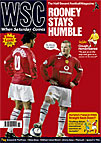 For Dan Turner, a 1990 FA Cup semi-final was the first staging of a derby against Manchester United in his lifetime and a 3-3 draw still constituted nirvana
For Dan Turner, a 1990 FA Cup semi-final was the first staging of a derby against Manchester United in his lifetime and a 3-3 draw still constituted nirvana
“Nick Faldo is on the verge of a second successive US Masters, yesterday we witnessed the fastest-ever Grand National, and this was the day you saw 13 goals in the FA Cup semi-finals” – I can still recall Des Lynam’s super-smooth sign-off on the video I watched as soon as I got home from Maine Road. I wasn’t much fussed about Crystal Palace’s earlier epic 4-3 victory over Liverpool, I just wanted to double-check that my eyes hadn’t been deceiving me for the previous two hours.
You could tell all season long that pundits and commentators alike were rather stunned by little Oldham Athletic’s progress to the business end of both of England’s major cup competitions. And they weren’t the only ones. We’d never seen the likes.
Prior to the “pinch-me season” (copyright Joe Royle), my football experience had consisted of standing in the Paddocks at Boundary Park and playing tig with a mate for 90 minutes. This classic schoolyard game served a number of purposes – mainly it took my mind off the mediocrity being served up on the field and reconnected the supply of blood to my feet. Boundary Park wasn’t nicknamed Ice Station Zebra for nothing.
We started season 1989-90 with four winless games and faded at the end to miss the (old) Second Division play-offs, but in the middle was an odyssey of enlightenment, free-flowing Brazilian (ish) football and merciless gianticide. Beating Leeds in those days was routine but never less than hugely satisfying. (In fact it was actually very funny, because the players who frequently proved the difference between the two sides were the very ones we’d nicked from Elland Road for peanuts.) Arsenal were sent packing with the Chaddy End scarcely able to believe it was chanting “easy, easy” at the humiliated League champions. Southampton found Astroturf and the Oldham monsoon season all just a little bit too much. We toyed with Everton for three games before sending them on their way. Aston Villa needed only the one. By the time we’d got to West Ham we’d all got a bit blasé. So our genial Scouse manager woke us from our complacency by deciding that the right formation for a League Cup semi-final was 3-2-5. But we needn’t have worried – it resulted in a 6-0 first-leg victory that still causes shivers among the Upton Park faithful, so I’m told.
Amid all this mayhem in the foothills of the Pennines, the names of Frankie Bunn, Ricky Holden, Earl Barrett, Denis Irwin, Andy Ritchie et al became household names hundreds of miles from their own households. Ricky Holden even ended up on A Question of Sport. (Or did I dream that bit?)
But for me, the whole thing came to a head at the FA Cup semi-final draw. As some ex-pros hand-chased the remaining balls around the velvet bag, I just knew it would result in the game of all games: Oldham Athletic v Manchester United.
To millions, doubtless, it was just another Cup game in the grand tradition. But to my 14-year-old mind, it was rather more than that. It was a showdown with all the middle-aged blokes on my street who would ruffle my hair and chortle at my navy blue shirt. It was a face-off with every snivelling little gobshite from school who didn’t know a crossbar from a corner flag, but still managed to support Man Utd.
Now you have to have been through some pretty lean times in order to view a 3-3 draw as revenge, but revenge it was. Of course, what we didn’t know when club legend Roger Palmer scored the final equaliser in extra time and Barry Davies had warbled about it being “the stuff of schoolboy comics”, was that this was the tip of our Mount Everest. In later years we sold Earl Barrett to fund the building of an away stand that has since housed the fans of Rushden & Diamonds, Chelmsford and Macclesfield, and replaced fleet-footed Paul Warhurst with the gargantuan Brian Kilcline. Our neighbours from Salford Quays, meanwhile, were on a journey towards European glory and Napoleonic megalomania.
But, as they say, it was fun while it lasted: Jim Leighton baring his arse after ripping his shorts in a collision with Ian Marshall; the same permed, mulleted, knock-kneed centre-half-cum-centre-forward scoring the most powerfully shinned goal in football history; the knowledge that we were playing an FA Cup semi at Man City’s ground and they weren’t allowed to be there; 18,000 Latics fans singing “we can play on grass as well” to the legions of people who had spent the whole season whining about our plastic pitch; and Alex Ferguson saying we were the best team United had played all year (what a nice man, we all thought).
We could have won it as well. Tricky Ricky shaved the post with a last-minute pile-driver. In the replay we hit the woodwork three times and had a legitimate goal disallowed. But in the tragic, poetic end, it was a 21-year-old Oldhamer, Mark Robins, wearing enemy red who steered in their heartbreaking winner.
As we drifted out of the replay and meandered through the Moss Side night, we consoled ourselves with the thought that at least we had the League Cup final at Wembley to look forward to. But I should have known that our moment had gone – I got stuck on the Tube and we lost 1-0.
From WSC 213 November 2004. What was happening this month